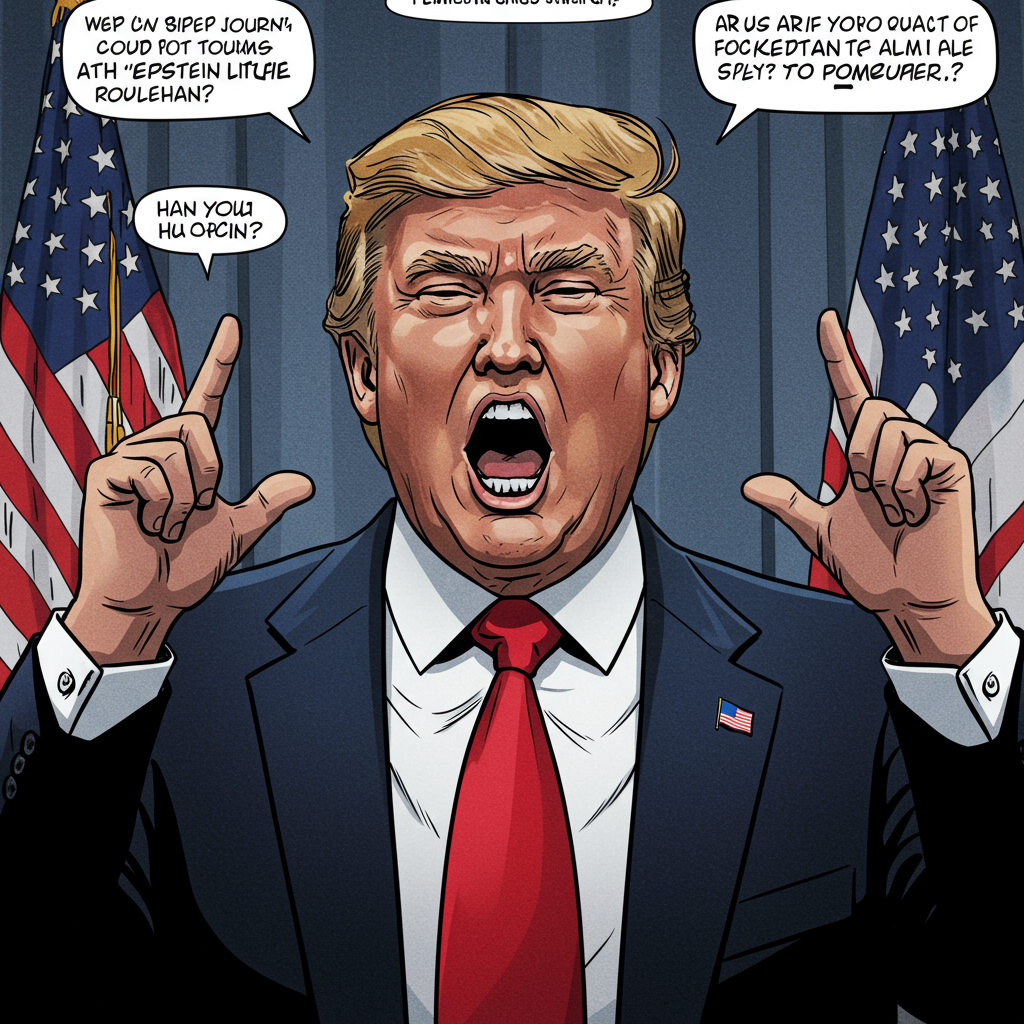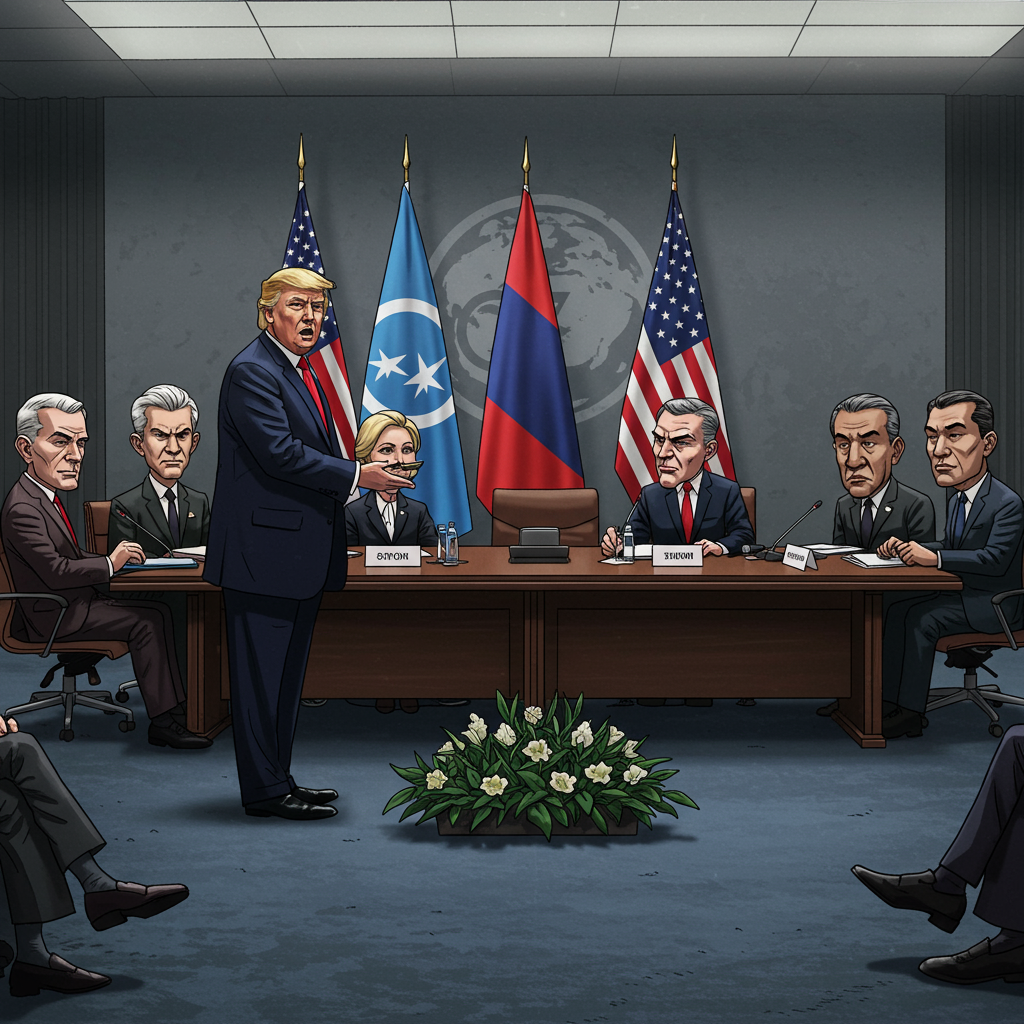A new Wall Street Journal report has ignited a fierce political storm, detailing an alleged “bawdy” letter from Donald Trump to Jeffrey Epstein. This revelation has sent shockwaves through political circles, prompting vehement denials from the former president and a significant rallying of his allies. The unfolding controversy highlights the complex and often contentious landscape surrounding the disgraced financier, Jeffrey Epstein. Readers are keen to understand the core allegations, the nature of Trump’s defense, and the broader political implications as the Epstein case continues to draw scrutiny.
The Core Allegation: A Disputed Letter Emerges
The Wall Street Journal recently published an exclusive report, claiming President Donald Trump penned a highly suggestive birthday letter to Jeffrey Epstein decades ago. The report detailed typewritten text and a provocative doodle of a naked woman, allegedly signed by Trump below the waist. This purported communication surfaced following a period of intense focus on the Epstein case within conservative circles, where speculation about hidden information has long persisted. The article’s immediate impact was significant, drawing swift and angry responses from the former president.
Upon its publication, Donald Trump vehemently denied writing the letter. He quickly took to Truth Social, his social media platform, labeling the report “fake” and vowing immediate legal action against The Wall Street Journal. Trump’s strong repudiation set the stage for a dramatic confrontation with the prominent news outlet, signaling his intent to aggressively challenge the veracity of their claims. The Wall Street Journal, for its part, has declined to comment on the legal threats.
Political Firestorm and MAGA Divides
The Wall Street Journal’s report landed amidst already simmering tensions within MAGA (Make America Great Again) communities regarding the Trump administration’s handling of the Jeffrey Epstein investigation. These circles had previously shown signs of fracturing, particularly over the perceived lack of transparency surrounding the case. Theories of a vast government conspiracy, often centered on a supposed “client list” hidden within the “Epstein files,” gained considerable traction among some of Trump’s fervent supporters. However, an FBI-Department of Justice joint report last week stated there was no evidence of such a list, somewhat deflating these long-nursed theories.
President Trump has consistently sought to downplay the entire Epstein ordeal, often characterizing it as a “hoax” orchestrated by Democrats. On Truth Social, he questioned why, if there were a “smoking gun” on Epstein, Democrats who controlled files for four years and had figures like Merrick Garland and James Comey in charge, did not use it. He emphatically declared, “BECAUSE THEY HAD NOTHING!!!” This narrative attempts to shift blame for any perceived lack of information onto his political adversaries.
Interestingly, several prominent MAGA figures who had previously been critical of the administration’s stance on the Epstein files quickly rallied to Trump’s defense after the WSJ report. Right-wing activist Laura Loomer and House Speaker Mike Johnson were among those who publicly supported the president. Johnson, who had earlier advocated for the Department of Justice to release all Epstein file information for “transparency,” decried the alleged letter’s existence. He stated he had spoken with the president, who called the allegation “patently absurd” and denied ever drawing such a picture, expressing immense frustration.
Elon Musk’s Public Challenge and “Cover-Up” Claims
One particularly vocal critic who later swung to Trump’s defense, then back to criticism, is billionaire Elon Musk. Following the initial WSJ report, Musk, who has a complex and often volatile relationship with Trump, launched a prolific social media campaign on X. He directly criticized the Trump administration’s handling of the Epstein files, particularly after an earlier promise to release more documents seemed to reverse. Musk explicitly labeled the administration’s actions as “a cover up (obviously)” and claimed that “so many powerful people want that list suppressed.”
Musk’s posts frequently mocked Trump’s “Epstein Hoax” characterization. He sarcastically questioned, “Wow, amazing that Epstein ‘killed himself’ and Ghislaine is in federal prison for a hoax,” referencing Ghislaine Maxwell’s 20-year sentence. He also used his AI chatbot, Grok, to query whether the government possessed names and ages of all individuals on Epstein’s plane, with Grok reportedly confirming that the DOJ and FAA hold “extensive passenger manifests and flight logs.”
While Musk’s broadsides were impactful, it’s important to note that his attacks have at times been “riddled with false assumptions,” including conspiracy theories about a “client list” that lack evidentiary support. This dynamic underscores the often-unpredictable nature of his public commentary. In response to Musk’s earlier criticisms, Trump himself posted on Truth Social, lamenting that Musk had gone “completely ‘off the rails,’ essentially becoming a TRAIN WRECK.” This public spat is part of a broader, simmering feud between the two influential figures, often fueled by disagreements over government spending and policy, which continues to unfold alongside other political controversies.
Unsealing Demands Amidst Legal Hurdles
Despite the White House and Attorney General Pam Bondi repeatedly stating there was no new information to release on Jeffrey Epstein, President Trump made a significant and unexpected move. Less than an hour after the WSJ report broke, he publicly ordered the Attorney General to begin the process of unsealing grand jury testimony in the Epstein case. This directive marks a distinct shift from the administration’s earlier posture of downplaying the situation and claiming a lack of discoverable new evidence.
However, the path to unsealing grand jury testimony is fraught with significant legal obstacles. Courts are typically highly averse to lifting the strict secrecy rules that apply to such proceedings, designed to protect witnesses, prevent witness tampering, and ensure the integrity of investigations. Any attempt to unseal these documents would likely face considerable legal challenges and could take an extended period to navigate through the judicial system. The order, while a clear statement of intent from Trump, faces an uphill battle against established legal precedents and the judiciary’s protective stance on grand jury secrecy.
The Broader Context: Political Tactics and Public Perception
Donald Trump’s response to the Wall Street Journal report and the renewed focus on the Jeffrey Epstein case can be viewed within the broader context of his established political tactics. His swift and aggressive denial, coupled with threats of legal action against media outlets, aligns with his long-standing approach to challenging unfavorable press. The use of Truth Social as a primary platform for these pronouncements allows him to directly address his base without traditional media filters, amplifying his narrative of a “fake” report and a politically motivated “hoax.”
The situation also highlights the persistent demand for transparency surrounding the Epstein case, particularly from segments of the American public who believe more information is being withheld. Trump’s order to unseal testimony, while legally challenging, could be seen as an attempt to respond to this pressure, or perhaps to deflect attention from the specific allegations in the WSJ report by initiating a broader legal process. The ongoing public dialogue, fueled by figures like Elon Musk and the shifting stances of Trump’s allies, ensures that the Epstein saga remains a potent and often divisive issue in the political landscape. The interplay of public opinion, political maneuvering, and legal realities will continue to shape the narrative around this deeply contentious case.
Frequently Asked Questions
What is the “suggestive letter” allegedly written by Donald Trump to Jeffrey Epstein?
The Wall Street Journal reported on a “bawdy birthday letter” that Donald Trump allegedly wrote to Jeffrey Epstein decades ago. The report details that the letter included lines of typewritten text and a doodle of a naked woman, supposedly with Trump’s signature below her waist. The alleged letter’s contents and existence were vehemently denied by President Trump following the report’s publication, who labeled it “fake” and threatened a lawsuit against the newspaper.
How has the political landscape reacted to claims about Donald Trump and the Epstein case?
The political reaction has been sharply divided. While President Trump has vehemently denied the allegations and labeled the entire Epstein situation a “hoax” by Democrats, some of his key allies initially criticized the administration’s handling of Epstein files. However, after the WSJ report, many, including House Speaker Mike Johnson and even, at times, Elon Musk, rallied to Trump’s defense, dismissing the alleged letter as absurd. Musk, notably, has also waged his own public campaign, accusing the administration of a “cover up” regarding the Epstein files, though some of his claims lack evidentiary support.
What are the legal implications of Trump’s order to unseal Jeffrey Epstein’s grand jury testimony?
Donald Trump’s order to unseal grand jury testimony in the Epstein case faces significant legal challenges. Grand jury proceedings are typically subject to strict secrecy rules designed to protect the integrity of investigations and individuals involved. Courts are generally reluctant to lift these rules, and any attempt to do so would likely encounter substantial legal hurdles and prolonged court battles. While the order signals Trump’s intent, the actual unsealing of testimony is a complex process with uncertain outcomes.



